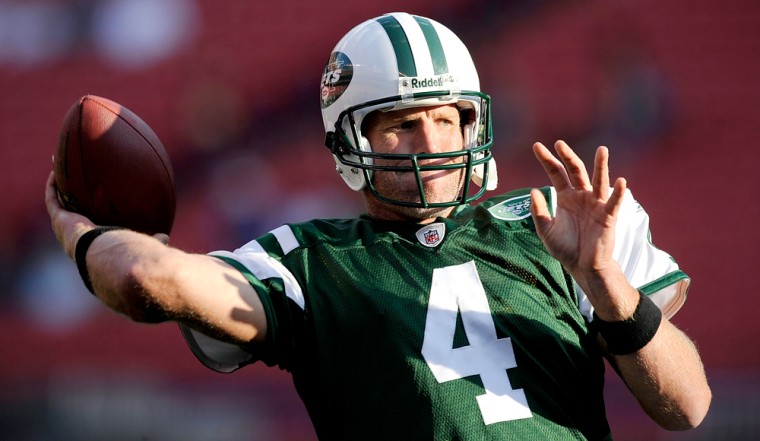The most exciting storyline of the 2008 National Football League season looks to be Brett Favre’s performance in the bright green uniform of the New York Jets.
The surefire Hall of Famer has been transplanted from tiny Green Bay to the biggest metropolis in America. Whether he can lift the mediocre Jets to the playoffs has been debated on talk shows and New Jersey barstools. But a bigger issue remains: What will Favre's impact be on the franchise's business fortunes in the upcoming years?
No doubt picking up Favre for a 2009 draft choice was a short-term boon to the Jets. Once the trade was announced, the team sold thousands of No. 4 jerseys within hours on its Web site, which promptly crashed from the demand. (In fact, Favre’s Jets’ jersey is the NFL’s best seller since April’s draft — his Packers’ jersey ranks second.) The Jets received priceless publicity from tabloids and TV shows, supplanting the Super Bowl champion Giants as the football talk of the town. Favre's first training camp workouts drew quadruple the usual number of fans.
But in the NFL, a star player is far less likely to jolt a franchise's long-term revenues than, say, a first-round pick in the NBA draft. First, there are 22 starters for a pro football team; the NBA offers five, meaning one player can change the whole complexion of a team. Second, football players are helmeted and hardly visible to the television audience, unlike in basketball, where players' faces are known by the fans during games and in advertisements.
Take LeBron James. He has been able to turn around the Cleveland Cavalier franchise. They drew fewer than 12,000 fans a game in the season before he arrived, lowest in the league; now they pack Gund Arena’s 20,000-plus seats. The Jets already sell out their games, as do most NFL teams.
Of course, with the Jets prepared to play in a new stadium in 2010, personal seat licenses are a crucial component. Though none will be required for the upper deck, the Jets hope to generate close to $400 million from PSLs, which is merely charging fans to retain their ticket privileges for two preseason games and eight regular-season contests. Although PSLs are common in the NFL today, the Jets have battled a public relations problem trying this approach.
Some have mused that Favre could boost PSL sales. Granted, he might persuade a small slice of excitable fans who were on the fence. But realistically, season-ticket holders on the whole are enraged they have to pay a special fee for the first time beyond the already-pricey ticket package. And by the time they sit down for the opening game in 2010, Favre will be close to 41 years old. He'll either be a creaky quarterback or out of football altogether.
No doubt ratings for Jets' games will soar this season because of intrigue over the new quarterback. CBS — which broadcasts AFC contests — has already made plans to distribute some battles to a bigger part of the U.S. than originally proposed. But in the NFL, TV revenues from the league's contracts are equally distributed, meaning the Jets won't see any sort of
special payoff down the line.
Keith Lambrecht, director of Sport Management Programs at Loyola University Chicago, believes Favre’s play and personality will continue to move merchandise, such as No. 4 jerseys.
”Favre is a legend and a likeable player because he plays the game like a kid,” he said. “He is a good role model for kids along with his wife, Deanna, who are both seen as everyday individuals. Parents will be willing to purchase a Favre jersey for their son or daughter.”
Much of what happens will depend on Favre’s performance on the field. Even at 38, he still shines. Favre's 2007 quarterback rating of 95.7 was among his best ever. His 4,155 yards passing were the most in a decade. His 66.5 percent completion rate was a career high.
Yet those were posted with a 13-3 team last season. Now he joins a 4-12 squad. True, with pickups such as veteran offensive guard Alan Faneca and defensive tackle Kris Jenkins, the Jets should be improved. Yet learning a new playbook, getting to know the speed of receivers, feeling the pressure to make plays for a team lacking firepower — how long can the honeymoon last, especially when the tabloids are already thinking up headlines for games when he flops?
The real long-term winner in the move should be Favre. If he chooses, he could cash in on New York endorsement opportunities. Playing another year rather than retiring to Mississippi will earn him a reported $12 million in salary. At the same time, once he retires, the Packers are still likely to hand him a lucrative package to promote the team.
But for the Jets, despite the blaze of publicity, good feelings and injection of quick cash, they shouldn’t expect Favre to be a revenue superhero going forward. While a Michael Jordan boosted the value of the Chicago Bulls’ franchise by tens of millions of dollars during his career and ensured season-ticket sales long after his departure, Favre’s impact on the Jets’ income will be more like a 5-yard completion: helpful, but not memorable.
